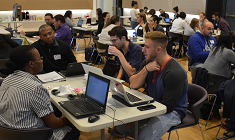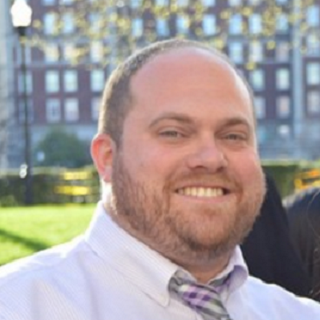Q&A with Kevin Shult, New Visions Global History Curriculum Pilot Teacher

The New Visions Global History Curriculum is currently being piloted by 90 teachers across 32 high schools in New York City. The curriculum, which spans two academic years and culminates with the New York State Regents Exam in Global History (a requirement for a Regents or Advanced Regents diploma), comprises a common scope and sequence of lessons, along with formative and summative student assessments. Participating teachers collaborate through structured professional development sessions and cycles of feedback. The curriculum integrates online resources, including primary and secondary sources, images, video, and maps into student-facing curricular materials and provides students a opportunities to think critically, and to read, write and speak like historians.
 Below you will find a Q&A with Kevin Shult, a Global History teacher in his ninth year at Hillcrest High School in Jamaica, NY, who is now in his second year participating in the pilot. Kevin’s primary focus this year is to assist 15 teachers at his school with implementing the New Visions Global History curriculum pilot in the classroom. Kevin was recently tapped to be part of the pilot’s new Teacher Advisory Board, which provides strategic guidance in shaping curriculum resources and the future direction of the pilot.
Below you will find a Q&A with Kevin Shult, a Global History teacher in his ninth year at Hillcrest High School in Jamaica, NY, who is now in his second year participating in the pilot. Kevin’s primary focus this year is to assist 15 teachers at his school with implementing the New Visions Global History curriculum pilot in the classroom. Kevin was recently tapped to be part of the pilot’s new Teacher Advisory Board, which provides strategic guidance in shaping curriculum resources and the future direction of the pilot.
Q: How or why did you become involved in the pilot?
Over the Summer of 2014, a friend sent me an argumentative essay rubric that mirrored many of the skills I already taught in class. After a little digging, I found this rubric was attached to the New Visions Global History curriculum pilot, which really piqued my interest. During the first few months of the 2014-2015 school year, I wasn’t an official member of the project yet but I corresponded often with the pilot leaders inquiring how they could help bring some of these tools into my classroom. Soon after, I was asked to join the pilot team and additional teachers from my school were invited prior to the start of this school year.
Q: What has been your biggest challenge in teaching Global History? How has this program helped you address this challenge?
The biggest challenge is consistently finding ways to make lessons fresh and exciting for my students and myself. The pilot has opened my eyes to new source documents I’ve never used, such as The Records of the Grand Historian from ancient China and John Green’s CrashCourse videos, as well as a database of reading and writing strategies that help me reach students of all levels. At the start of each unit, I’ve introduced an activity that allows me to assess student comprehension of academic and content vocabulary. Within minutes, I can find out which students need support on vocabulary and which terms we will need to emphasize as documents are introduced throughout the unit. This early start into vocabulary creates in-class discussions, allowing students the time to make personal connections to historical terms and learn from one another. I’ve seen students use vocabulary more in their responses both verbally and written as a result.
Q: How are the curriculum pilot materials different than other curricula you have tried?
I don’t think I’ve ever seen a collection of resources for teachers as organized as the one New Visions has put together. The multitude of reading and writing strategies organized in one place has saved me hours of searching. The curriculum not only provides ideas and suggestions for how a lesson could work, but it also contains differentiated activities. Everything is Common Core aligned with reading and writing strategies worked into each unit. These amenities, along with the PDs, are rarely found in present-day curriculums, especially free curriculum programs.
Q: How have the Professional Development workshops helped you with implementing the curriculum?
The PD events have given me the ability to sit and think through how I would teach a unit to my students. The best part of each event is that dozens of other teachers are doing this at the same time, allowing creative minds to come up with new and exciting ways to bring Global History alive. For example, annotation is a skill we teach our freshman in the first two months of school. After taking a workshop designed to build comprehension among ELL and Special Ed students using pre-, during-, and post-reading strategies, I found a way to differentiate annotation techniques. Rather than use YDC’s annotation rubric for all my students I have implemented Vaughn and Estes’ INSERT (Interactive Notation System for Effective Reading and Thinking). Using INSERT improves the level of engagement in class without writing extensive notes. The pilot allowed me to work through the new strategy with instructional specialists and other teachers before I implemented it in class.
Q: What units or lessons plans are you most excited about and why?
I enjoy bringing history to life for my students, so things that will open their eyes in amazement or disgust always bring a smile to my face. I was a big fan of last year’s activities revolving around Machiavelli's The Prince, which required students to identify previously studied rulers and cite evidence from their time in power to determine if they ruled in a way Machiavelli would have approved of. I turned the class into a courtroom and students played leaders under cross examination. This year I’m collaborating with our Humanities class to compare Dante Alighieri’s philosophy of government as read in The Inferno to Machiavelli’s The Prince.
Q: How do you think this curriculum will help you in preparing students for the Regents exam?
The majority of my students have difficulty writing thematic essays, which is a big component of the Regents exam. The curriculum provides a ton of opportunities for teachers to not only assign a writing assignment, but strategically provides skill-based writing lessons grounded in historical issues within each unit. One of the first skills tested freshman year, writing thesis statements, can be found in the first unit. The Deconstructing DBQ prompts activity helped students establish a purpose for reading documents and writing DBQ essays. The curriculum’s supplemental materials provide teachers with a myriad of opportunities to differentiate reading and writing for students of all levels.
Q: Why did you encourage other teachers at your school to join the pilot? How did you go about encouraging them to participate?
The pilot is packed with Common Core activities and includes new topics from the NYS and NYC Scope & Sequence, something our teachers had not been able to leverage before. Last year I shared some activities and writing strategies with my department, along with the pilot website, and a number of teachers started to ask me how they could get involved. This year our school is running the pilot in all freshman Global History classes and the instructional specialists have welcomed them with open arms. The teachers like the support network the pilot provides and have already shared best practices within the department.
Q: What role have you played in supporting your fellow teachers in the pilot? What feedback have you received from them since joining?
I draw upon my teaching experiences to serve as a resource and mentor for teachers in my school. Each week, I work with teachers to review the pilot curriculum and help differentiate content for our diverse student population. I send out newsletters after each PD to update teachers on the pilot and share new resources with them whenever time allows. Many teachers enjoy the diversity of the source documents and the ability to mix and match activities that are already differentiated for students.
Q: What feedback on the curriculum have you offered to the New Visions instructional coaches? How has your feedback been acted upon?
Each pilot teacher has the ability to provide commentary, ask questions, or suggest edits to any part of the curriculum, which is easy to do since all of the resources are available using Google Apps for Education. Prior to teaching I was an editor for a financial news company, so the majority of my feedback was grammatical along with suggestions on how to improve the format of student-facing materials. The curriculum instructional specialists, who are managing the pilot, are open to any feedback as long as it improves the end result and they act on any suggestions brought to them rather quickly.
Q: What advice do you have for other Global History teachers interested in the pilot resources?
Check out the curriculum website at www.globalhistory.newvisions.org and don’t be afraid to get in contact with the curriculum instructional specialists, Timothy Lent (tlent@newvisions.org) or Kameelah Rasheed (krasheed@newvisions.orgundefined). I started the pilot on the outside looking in and a year later was chosen to be part of their Teacher Advisory Board. We’re always looking for feedback and ways to improve the pilot. Your suggestions could help hundreds of other teachers and their students across the state. All it takes is an email to get started.